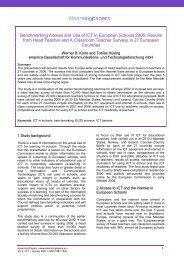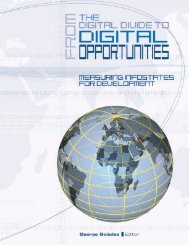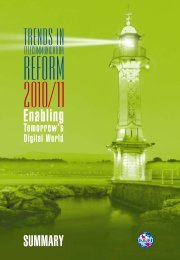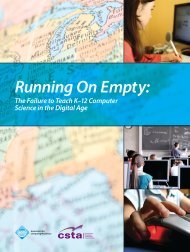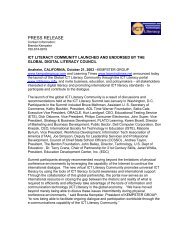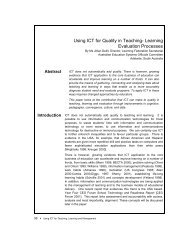Education briefing paper: - ICT Digital Literacy
Education briefing paper: - ICT Digital Literacy
Education briefing paper: - ICT Digital Literacy
Create successful ePaper yourself
Turn your PDF publications into a flip-book with our unique Google optimized e-Paper software.
www.educationimpact.net<br />
<strong>Education</strong> Impact is an<br />
independent global<br />
fellowship of the world’s<br />
leading consultants focused<br />
on the effective use of<br />
information technology to<br />
transform teaching, learning<br />
and institutional administration.<br />
Its fellows are leading<br />
strategists who share your<br />
vision and appreciation for<br />
transformative power of<br />
technology in education<br />
<strong>Education</strong> <strong>briefing</strong> <strong>paper</strong>:<br />
Employability and workforce development<br />
This is a seminal moment in history for education and competitiveness. The fundamental shifts in<br />
the economy demand bold and creative policies. Formalizing the connection between education and<br />
competitiveness, with an agenda focused on 21st century skills—which are widely acknowledged and<br />
supported by voters, employers, educators, researchers, and thought leaders—is the starting point.<br />
The Partnership for 21st Century Skills<br />
Key concepts<br />
Employability<br />
Formal education usually provides only a very basic introduction to the world of work for young<br />
people, and often they enter the workforce without the knowledge and skills to be immediately<br />
productive contributors. Some students may take relevant professional courses or have short periods of<br />
work experience during school, but the vast majority of them do not take advantage of these<br />
opportunities to learn the skills and attitudes needed in commercial enterprises.<br />
Workforce development<br />
Employers generally prefer to recruit staff who already have the necessary skills, but shortages in key<br />
areas—like more advanced information and communication technology (<strong>ICT</strong>) skills—mean they can’t<br />
always do so. As a result, they often need to train existing staff to undertake new roles.<br />
Changes in the workplace, such as new technology and work methods, and long-standing employee<br />
objectives, like individual career goals, are also likely to demand new skills from the existing workforce.<br />
This is particularly the case as developed countries reduce their manufacturing bases and move toward<br />
establishing a knowledge economy to stay internationally competitive.<br />
Government education policy and training programs<br />
National governments are responsible for developing policies that keep their economies strong<br />
and their citizens gainfully employed. As local economies experience the impact of mechanization and<br />
globalization, governments will devise new policies and programs to retrain people made redundant or<br />
otherwise disadvantaged in the labor market.<br />
This is particularly significant in times of world recession, when governments may be inclined to reduce<br />
their investments in <strong>ICT</strong> skills. In difficult economic times, the need for public services to deliver more<br />
within a framework of reduced costs argues for increased investment in <strong>ICT</strong> skills to boost productivity.<br />
The links between <strong>ICT</strong> investment and productivity are well documented.<br />
In a modern knowledge economy, the use of computers in work becomes more common and<br />
increasingly sophisticated. Jobs that previously required no more than the use of pen and <strong>paper</strong> now<br />
demand familiarity with hand-held terminals to track parcel deliveries, place restaurant orders, and<br />
control retail stocks. <strong>Digital</strong> literacy begins to replace written literacy in determining whether applicants<br />
have all the necessary skills for employment.<br />
Page 1<br />
Sponsored by
In developing economies, the choices may be few. For example, not everyone will be able to continue<br />
their education, so individuals will have to rely on obtaining further training within the work<br />
environment. Or they may have to take on unpaid part-time study or e-learning on their own time.<br />
In such circumstances, governments ought to review the suitability of their education programs to<br />
meet emerging national skills requirements.<br />
Key issues<br />
The need to help ensure that government-led programs are sustainable<br />
Governments may hope to raise national skill levels through funding specific programs, such as those<br />
for women re-entering employment or those for the socially disadvantaged. Alternatively, through<br />
increased funding for technology-related university courses, they may promote the development of<br />
certain skills with the aim of becoming more internationally competitive.<br />
To help ensure sustainability, workforce development programs need to address the following:<br />
Finance<br />
Governments will often expect business to pick up the eventual costs of workforce<br />
development, though they are likely to provide funding to get it started.<br />
Human resources<br />
A limited supply of qualified trainers to lead courses may necessitate the central creation<br />
of model course materials for free distribution to schools or trainers<br />
Time<br />
Time away from work means reduced efficiency. Computer-based solutions and e-learning<br />
courses might enable better use of the working day.<br />
Project leadership and management<br />
Evidence suggests that human networking and business relationship building by training<br />
center managers are at least as important as trainees’ <strong>ICT</strong> skills acquisition in securing<br />
employment for them after they complete the program.<br />
The need to address more advanced <strong>ICT</strong> skills requirements<br />
The acquisition of basic <strong>ICT</strong> skills is an important first step, but research indicates that on their own<br />
they are rarely enough. There is, though, little doubt that they represent the most natural starting<br />
point for government-sponsored programs in the developing world.<br />
In the United States, the study by the Partnership for 21st Century Skills, “Are They Really Ready<br />
to Work?” (2006), provided a comprehensive picture of the skills needed in the workplace this<br />
century—a departure from the traditional emphasis on basic literacy and numeracy. The study asked<br />
400 U.S. employers what skills they valued in a new employee. The findings state that a new set of<br />
“applied skills,” including information technology application, diversity, and teamwork/collaboration,<br />
will be increasingly important to help the United States remain internationally competitive.<br />
In Europe, the International Data Corporation white <strong>paper</strong>, “e-Skills – The Key to Employment and<br />
Inclusion in Europe” (2007), reported on a survey of 600 employers in 10 European countries. It<br />
concluded that, overall, the European workforce had good basic <strong>ICT</strong> skills, but the <strong>paper</strong> predicted<br />
a growing future demand for advanced <strong>ICT</strong> skills and e-business skills. Three-fourths of this survey’s<br />
respondents believed the workforce’s <strong>ICT</strong> skill levels will be crucial for their organization’s future, in<br />
terms of competitiveness, innovation, and growth.<br />
Page 2<br />
Sponsored by
Lack of time and money can be a barrier to helping ensure that employees have these critical skills.<br />
Consequently, organizations may rely on individual employees to pick up skills as they go along. Too<br />
few make systematic use of more flexible delivery solutions, such as e-learning, that could remedy<br />
the situation.<br />
Taken together, the findings of international research suggest the need to reshape future<br />
government-sponsored programs away from wide-reaching basic <strong>ICT</strong> skills programs and toward<br />
more tightly targeted, flexibly delivered provision for:<br />
Applied <strong>ICT</strong> skills<br />
The use of common generic software tools and specialized tools supporting business<br />
functions, such as accounting, sales and marketing, or production applications.<br />
E-business skills<br />
The capability to exploit opportunities provided by <strong>ICT</strong>, notably the Internet, to:<br />
• Help ensure more efficient and effective performance by different organizations.<br />
• Explore new ways of conducting business and organizational processes.<br />
• Establish new businesses.<br />
With the exception of vendor-supported and certified training programs to develop advanced skills<br />
for maintenance of networks (Cisco) and operating systems engineering (Microsoft, Red Hat), few<br />
examples of publicly funded advanced skills training exist at present. However, these may provide<br />
valuable models for the required skills enhancement.<br />
Global solutions<br />
Brief reports from exemplar programs undertaken in Latin America and Europe<br />
CIS Report on Computer Skills Training and Youth Employability in Latin America<br />
CIS Report on Computer Skills Training and Youth Employability in Latin America (Center for<br />
Information and Society, University of Washington, September 2008). Funding for this study was<br />
provided by the Microsoft Community Affairs Unlimited Potential Community Technology Skills<br />
program<br />
“Teresa is one of many young mothers enrolled in morning computer classes at the Santa Fe<br />
Community Center in Mexico City. She originally studied to become a secretary but couldn’t find a<br />
job so she ended up working at a local paint factory instead. The computer classes have given her<br />
new hope. When Teresa finishes her classes, she will … try again for the secretarial career she wanted<br />
before now that she knows how to use a computer and email. Teresa even looks forward to helping<br />
buy a new house for her young family.”<br />
Summary of key findings:<br />
• Program graduates believed that the <strong>ICT</strong> training they received helped them<br />
overcome economic and social constraints (that is, it offered them more opportunities)<br />
• The <strong>ICT</strong> skills that graduates acquired made them feel empowered and gave them<br />
new opportunities to teach others and to seek employment.<br />
• Training helped build self-esteem and gave graduates a sense of satisfaction because they<br />
had expanded their opportunities.<br />
• The positive perceptions and high expectations of graduates did not always<br />
translate into employment.<br />
• Around half [of those studied] looked for work after taking these courses, but less<br />
than one-fourth found it; only 2-9 percent started a business.<br />
• The percentage of graduates able to apply their new computer skills in their new<br />
jobs varied widely by region.<br />
Page 3<br />
Sponsored by
• Training center leadership was critical for the effective fulfillment of training<br />
objectives, the building of partnerships for center sustainability, and the employment of<br />
its graduates.<br />
Delivering 21st Century Skills for Employability in Europe (2006)<br />
The European Alliance on Skills for Employment (a collaboration among members of the European<br />
e-Skills Certification Consortium [eSCC], with the support of State Street Corporation and Randstad<br />
Holding nv) expects to provide <strong>ICT</strong> training for 20 million people in Europe by 2010.<br />
The alliance has no published findings available at this stage, but independent research shows that<br />
human resources managers in Europe:<br />
• Regard certified IT skills as important for both IT and non-IT roles.<br />
• Would choose candidates with IT skills certifications over candidates without them.<br />
• Would pay an average of 6.9 percent in additional salary for these certified skills.<br />
Visit us at www.microsoft.com/education<br />
MICROSOFT MAKES NO WARRANTIES, EXPRESS OR IMPLIED, IN THIS SUMMARY.<br />
This document is provided “as-is.” Information and views expressed in this document, including URL and other Internet Web<br />
site references, may change without notice. You bear the risk of using it.<br />
This document does not provide you with any legal rights to any intellectual property in any Microsoft product.<br />
Page 4<br />
© 2010 Microsoft Corporation. All rights reserved.<br />
Sponsored by



